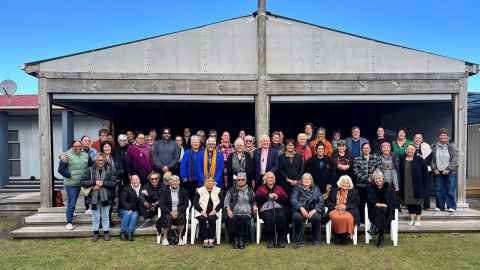Urgent call for dementia support in rural Māori communities
1 July 2025
Too many rural whānau are caring for loved ones with mate wareware in silence. A kaupapa led by the Centre for Brain Research is bringing answers to their doorsteps.

A recent visit to Te Ao Hou Marae in Whanganui has highlighted the urgent need for dementia support in rural Māori communities, says Dr Makarena Dudley MNZM, a specialist in the condition known in te reo Māori as mate wareware.
Mate wareware is a progressive condition that affects the brain, making it harder for people to remember, think clearly, or carry out everyday tasks. Māori are more likely to experience mate wareware than any other group in Aotearoa New Zealand, but in many rural areas, whānau are left without the information, diagnosis or the support they need.
Dr Dudley, who is Deputy Director Māori at the Centre for Brain Research Te Huinga Hinengaro, and clinical neuropsychologist in mate wareware, says her visit to Whanganui was both uplifting and deeply concerning.
“We left inspired by how open and engaged everyone was – hearing stories of how mate wareware is affecting whānau, either directly or through loved ones,” she says.“But we were also heartbroken. Some people have been caring for their loved ones alone for years, not knowing what’s happening or where to turn for help.”
Dudley and world-renowned brain scientist Professor Sir Richard Faull have been travelling the country to bring mate wareware education to Māori communities, especially in areas where healthcare services are hard to access.
“We want to reach the places that health services don’t always get to, where people are still waiting for answers.”
One of the most urgent issues, Dudley says, is the toll on kaiāwhina (carers) – the family members who take on the role of caring for someone with the brain condition.
“Our research shows that many kaiāwhina are dying before the person they’re caring for. That tells us how heavy the load is. It’s not just about the person with dementia – we have to support the whole whānau.”
It also highlights the tikanga of Māori people who believe in caring for their whānau until the very end instead of putting whānau into care. But for many Māori carers, it’s an exhausting and lonely journey. They may be looking after their parents or kaumātua (elders) for years, often without fully understanding the signs of mate wareware or knowing where to go for support.
“This kaupapa is about lifting that burden. Kaiāwhina need encouragement, practical tools, research updates, and care that speaks to who they are and how they live.”
A new way: marae-based research clinics
The recent Whanganui visit builds on earlier success in the Far North, where a mate wareware clinic was launched by the Centre for Brain Research at Roma Marae in Ahipara. The model has since expanded to Ōmanaia Marae in Hokianga, supported by Te Hau Ora o Ngāpuhi.
Rather than asking whānau to travel to unfamiliar clinics or hospitals, the team brings support directly to marae – places that feel like home.
“We meet whānau where they are – on the marae, over a cup of tea. It’s a place that’s culturally supportive and responsive, with warmth, wairua (spirituality), and whakawhanaungatanga (connection). That’s where real healing can begin,” says Sir Richard.
Assessments are gentle and relational, often accompanied by karakia, kōrero and laughter. Using the Māori term mate wareware instead of dementia also helps reduce stigma and fear.
“It’s not just about diagnosing an illness. It’s about restoring mana – and giving whānau a sense of clarity and strength.”
Bringing brain science to life
At each marae visit, Professor Sir Richard Faull helps whānau understand how the brain works and what can be done to keep it healthy. He encourages simple lifestyle changes – like walking regularly or staying socially active – which research shows can help delay the onset of dementia.
“I’m not saying you have to run a marathon,” he laughs. “But walking every day really makes a difference.”
He also highlights the power of te reo Māori as a form of brain training.
“Speaking more than one language activates different parts of the brain. For kaumātua, speaking Māori regularly can help strengthen memory and delay the effects of dementia.”
His interactive presentations often spark new ideas for keeping kaumātua connected, engaged, and mentally active.
A mission with urgency
Together, Dudley and Sir Richard combine mātauranga Māori (Māori knowledge) with world-class science and research – creating a model of care that uplifts, informs and empowers.
“There are more than 700 marae across Aotearoa. We believe we can reach them all,” says Dudley.
Their mission is simple but urgent:
- Reach the whānau who’ve been left behind.
- Support and undertake research with the carers doing the hard mahi in silence.
- Make sure every community, no matter how remote, knows there is hope and help.
Media contact
Te Rina Ruka-Triponel | Kaitohutohu Pāpāho Māori
E: te.rina.triponel@auckland.ac.nz